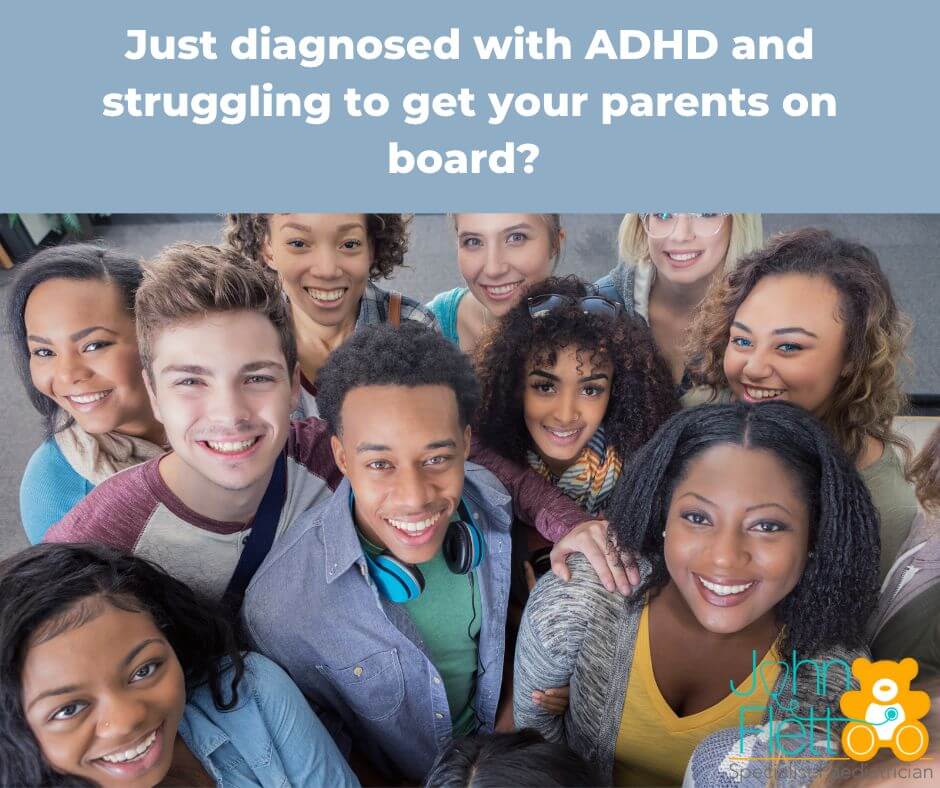Just diagnosed with ADHD and struggling to get your parents on board?

Article: Understanding My ADHD and Handling Parents Who Don’t Believe It’s Real
When a young adult is diagnosed with ADHD, it’s not uncommon for parents to be skeptical or even reject the idea that their child has a neurological condition. To navigate this situation, it’s important to educate yourself and your family about ADHD and find support from those who understand the challenges it presents.
Coping with an ADHD Diagnosis When Parents Aren’t Supportive
Q: “I’m 20 years old and have been diagnosed with ADHD. Before the diagnosis, my parents were always frustrated with my behavior, but didn’t understand why I acted the way I did. Even after my doctor explained my ADHD symptoms, my family still doesn’t believe that ADHD is real or that it’s the reason for my behavior. Some of my relatives even advise my parents to use ‘tough love’ with me. How can I help them see that I am more than just a diagnosis they don’t understand?”
Receiving an ADHD diagnosis can be an emotional rollercoaster. You might feel a mix of relief, sadness, and even anger. You may wonder why you didn’t find out earlier, as it could have made life a lot easier. As you learn about ADHD and how to manage your symptoms, it’s important to remember that you are not lazy or unintelligent.
Feeling Rejected When Parents Don’t Accept ADHD
It can be hurtful when your parents don’t acknowledge your ADHD diagnosis. Their rejection might feel like they are dismissing an important part of who you are. It’s confusing that they don’t want to understand the root cause of your behaviors, which they’ve been upset about for years.
Unfortunately, many parents struggle to accept their adult child’s ADHD diagnosis. Since there isn’t a clear-cut test, like a blood test or brain scan, for diagnosing ADHD, it can be challenging to convince skeptics. However, ADHD is a recognized disorder with specific diagnostic criteria outlined in the Diagnostic and Statistical Manual of Mental Disorders. Consider sharing this information with your parents to help them understand.
ADHD Is Real, Despite What Others May Believe
Even though everyone experiences some level of distraction, procrastination, or forgetfulness, ADHD symptoms are more frequent and severe, impacting daily functioning. There is scientific evidence supporting the existence of ADHD, with brain scans showing biological differences in those with ADHD compared to neurotypical individuals. Additionally, ADHD is recognized by numerous reputable organizations and government agencies.
Keep these facts in mind, as it can be easy to doubt the existence of ADHD when your loved ones don’t believe in it.
It’s essential to recognize that your parents’ misguided advice from relatives is not helpful. Standard parenting advice often falls short when it comes to raising a child with ADHD and can even harm their self-esteem.
You Are More Than Your Diagnosis
Understanding your ADHD diagnosis helps you find practical solutions to your challenges. ADHD is a part of you, but it doesn’t define you. If your parents don’t understand your diagnosis, it’s because they’ve chosen not to. It’s not your responsibility to change their minds, as it’s difficult to convince people who don’t believe in ADHD.
Instead, focus on getting help and support for your ADHD. Here are three suggestions:
- Connect with others who understand ADHD. Seek out like-minded individuals who have ADHD and can relate to your experiences. Find a local support group to establish face-to-face connections, which can be incredibly valuable. These connections can help balance the negative messages you receive from your family and reduce any feelings of shame or embarrassment.
- Learn about ADHD. Educate yourself by reading books, listening to podcasts, and watching webinars. Set goals to consistently expand your knowledge about ADHD.
- The more you understand the condition, the more empowered you’ll feel in managing it. Over time, you’ll discover the various ways ADHD affects your life.
- Address your symptoms. Successfully managing ADHD often involves a combination of approaches, such as medication, therapy, accommodations at school or work, improving social skills, and making lifestyle changes like adopting an ADHD-friendly diet and better sleep habits. Don’t try to tackle everything at once; instead, take it one step at a time. Consult your doctor about medication options and prioritize addressing the most significant challenges in your life first.
- In time, your parents may change their beliefs about ADHD and accept your diagnosis. However, if they don’t, you can still move forward by seeking support and help from other sources. With your newfound understanding of your ADHD and the support of others, you can navigate life with your diagnosis and perhaps even gain your parents’ support in the future.


Responses